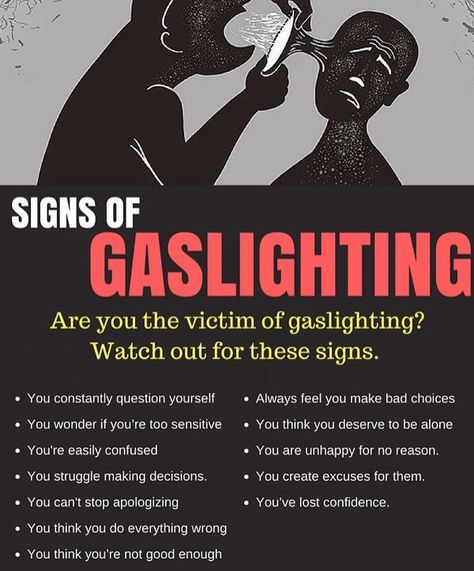According to the urban dictionary, gaslighting is a form of intimidation or psychological abuse, sometimes called Ambient Abuse where false information is presented to the victim, making them doubt their own memory, perception and quite often, their sanity. The classic example of gaslighting is to switch something around on someone that you know they’re sure to notice, but then deny knowing anything about it, and to explain that they “must be imagining things” when they challenge these changes.
A more psychological definition of gaslighting is “an increasing frequency of systematically withholding factual information from, and/or providing false information to, the victim – having the gradual effect of making them anxious, confused, and less able to trust their own memory and perception.
Gaslighting, is usually practiced by a single deceiver, or “gaslighter,” on a single victim over an extended period. Its effect is to gradually undermine the victim’s confidence in his own ability to distinguish truth from falsehood, right from wrong, or reality from appearance, thereby rendering him pathologically dependent on the gaslighter in his thinking or feelings.
As part of the process, the victim’s self-esteem is severely damaged, and he becomes additionally dependent on the gaslighter for emotional support and validation. In some cases, the intended (and achieved) result is to rob the victim of his sanity. The phenomenon is attested in the clinical literature as a form of narcissistic abuse whereby the extreme narcissist attempts to satisfy his pathological need for constant affirmation and esteem (for “narcissistic supply”) by converting vulnerable people into intellectual and emotional slaves whom he paradoxically despises for their victimhood. Because the gaslighter is himself typically psychologically disordered, he is often not fully aware of what he is doing or why he is doing it.
How Gaslighting Originated
The term is derived from the title of a 1938 British stage play, Gas Light, which was subsequently produced as a film, Gaslight, in the United Kingdom (1940) and the United States (1944). Those dramas vividly, if somewhat simplistically, depicted some of the basic elements of the technique.

These may include: attempting to convince the victim of the truth of something intuitively bizarre or outrageous by forcefully insisting on it or by marshaling superficial evidence; flatly denying that one has said or done something that one has obviously said or done; dismissing the victim’s contrary perceptions or feelings as invalid or pathological; questioning the knowledge and impugning the motives of persons who contradict the viewpoint of the gaslighter; gradually isolating the victim from independent sources of information and validation, including other people; and manipulating the physical environment to encourage the victim to doubt the veracity of his memories or perception.
In the play and films, for example, a deceitful husband drives his wife to near insanity by convincing her that she is a kleptomaniac and that she has only imagined the sounds in the attic and the dimming of the gaslights in their house, which were actually the result of his searching for her aunt’s missing jewels.
Gaslighting Signs You should know
According to Robin Stern, PhD, author of the book “The Gaslight Effect: How to Spot and Survive the Hidden Manipulation Others Use to Control Your Life,” signs that you are a victim of gaslighting include:
- no longer feeling like the person you used to be
- being more anxious and less confident than you used to be
- often wondering if you’re being too sensitive
- feeling like everything you do is wrong
- always thinking it’s your fault when things go wrong
- apologizing often
- having a sense that something’s wrong, but being unable to identify what it is
- often questioning whether your response to your partner is appropriate (e.g., wondering if you were too unreasonable or not loving enough)
- making excuses for your partner’s behavior
- avoiding giving information to friends or family members to avoid confrontation about your partner
- feeling isolated from friends and family
- finding it increasingly hard to make decisions
- feeling hopeless and taking little or no pleasure in activities you used to enjoy
Gaslighting Examples You should know
People who gaslight become expert at pushing your buttons, and they know your sensitivities and vulnerabilities and use that knowledge against you. They make you doubt yourself, your judgment, your memory, and even your sanity. Examples include:
- Trivializing how you feel: “Oh yeah, now you’re going to feel really sorry for yourself.”
- Telling you that people are talking behind your back: “Don’t you know? The whole family talks about you. They think you’re losing it.”
- Saying things to you that they later deny having said: “I didn’t say I’d take the deposit to the bank. What are you talking about? Thanks a lot for the insufficient funds fee we’re going to get.”
- Hiding objects from you, and then deny knowing anything about it: “You seriously can’t find your sunglasses again? That’s alarming.”
- Insisting you were or were not at a certain place, even though it’s not true: “You’re crazy. You never went to that show with me. I should know.”
How do you recognize that gaslighting is happening?
Take a look at the list below. If any part of the list resonates with you, you may be involved in a gaslighting relationship and need to look further.
- You ask yourself, “Am I too sensitive?” many times per day.
- You often feel confused and even crazy in the relationship.
- You’re always apologizing.
- You can’t understand why you aren’t happier.
- You frequently make excuses for your partner’s behavior.
- You know something is wrong but you just don’t know what.
- You start lying to avoid put-downs and reality twists.
- You have trouble making simple decisions.
- You wonder if you are good enough.
While all of these symptoms can occur with anxiety disorders, depression, or low self-esteem, the difference with gaslighting is that there is another person or group that’s actively engaged in trying to make you second-guess what you know is true. If you don’t typically experience these feelings with other people but do with one particular individual, then you might be a victim of gaslighting.
Some common phrases you might hear from your gaslighter are:
- You’re so sensitive!
- You know that’s just because you are so insecure.
- Stop acting crazy. Or: You sound crazy, you know that, don’t you?
- You are just paranoid.
- You just love trying to throw me off track.
- I was just joking!
- You are making that up.
- It’s no big deal.
- You’re imagining things.
- You’re overreacting.
- You are always so dramatic.
- Don’t get so worked up.
- That never happened.
- You know you don’t remember things clearly.
- There’s no pattern. Or: You are seeing a pattern that is not there.
- You’re hysterical.
- There you go again, you are so ungrateful.
- Nobody believes you, why should I?






